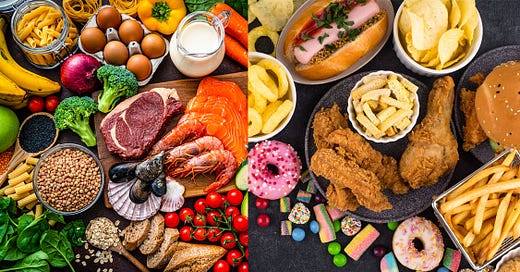This week I was asked my thoughts on the reported negative health effects of ultra processed foods.
So here they are…
First of all there is one huge problem:
There is no clear definition.
That’s right, there is no single, universally accepted definition for ultra-processed foods (UPFs).
Many foods that are classified as UPFs have a tonne of nutritional value often MORE so because they are processed e.g. adding vitamins and minerals.
Many foods that are classified as UPFs are high in fat, sugar, salt and calories and have little nutritional value and probably should be avoided or heavily minimised.
Common sense is often more useful than a food’s categorisation of being an UPF- most children could tell the difference if you asked them if a donut or yoghurt would be a healthier breakfast option (both are UPFs).
There is also evidence that replacing butter with plant based oil spreads reduces mortality. This would be an example of an UPF being better for you than the more natural version.
Some processing is good!
Pasteurisation kills harmful bacteria, adding vitamins and minerals means less people become deficient in these nutrients, some processing improves nutritional content of food by reducing saturated fat, processing can increase shelf life and reduce food waste, processing also often makes food cheaper and more accessible (easy to forget that most people worrying about UPFs are in a highly privileged position where they can afford to buy fresh food)
Rather than labelling a huge variety of foods as UPFs and trying to eliminate them all we should be looking at individual foods and deciding their place within the context of our diet as a whole
The best place to start is to consider the reasons why UPFs are linked to poorer health outcomes.
Here is a list of the most likely reasons:
High fat, high sugar, high salt content of many of these foods (but as I’ve already pointed out not all)
Palatability - basically they taste really good so you eat more
Low satiety per calorie
Energy density- think the opposite of food volume (the underrated factor I am always harping on about). This means that you’re consuming a lot of calories per mouthful.
Factors we are less sure of: specific processing techniques and additives (more research needed here)
Now you know this you can more clearly identify foods which you may want to minimise / avoid - i.e. the ones that fit the criteria of the above list.
I don’t think anyone would be shocked to learn you should eat more of the food on the left and less of the food on the right.
My advice:
Focus on food quality and use common sense. Just because yoghurt and chocolate bars are both classified as UPF doesn’t mean they have the same impact on you.
Trying to eliminate all UPFs is not necessary or beneficial - this is both my opinion and what the current research supports.
Looking for evidence based coaching support? apply to work with me here




